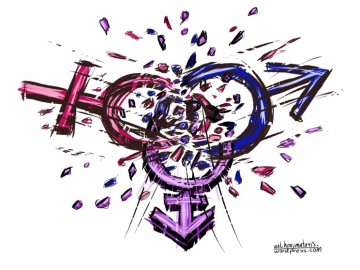Opinion: When nouns favor men, other genders get lost

By Mckenna Toston
The Guardsman
Question: What do the Declaration of Independence and The Guardsman have in common?
(Hint: the answer is not revolutionary writing).
Answer: They both use male-specific language:
“All men are created equal.”
“The Guardsman.”
Gender-specific language is not inherently bad or offensive. The problem occurs when nouns like man or men (freshmen, mankind) are used to represent not only men, but women as well.
Such is the case with both the Declaration of Independence and The Guardsman.
It may not seem like a serious offense, but when seen through the lens of equality, it’s discriminatory. Plain and simple.
Why does mankind represent everyone? And why do women have to identify as Guardsmen?
This type of gender-specific language discredits the significance of women and reinforces the idea that women are secondary to men.
Jennifer Saul argues that, “terms like ‘he’ and ‘man’ contribute to making women invisible — that is, to obscuring women’s importance,” in her research paper titled “Feminist Philosophy of Language.”
Male-specific language is evidence of a deep-rooted gender bias in our society.
What if we switched these terms to womankind and Guardswoman? Would men be willing to identify with them in the way that women are expected?
States across the U.S. have taken important steps to eliminate the gender bias.
Florida, North Carolina, Illinois and Washington have eliminated male-specific language, such as penmanship and policeman, from their official lexicon.
And it’s no small task. The English language is steeped in gender-biased language, which some feminists believe is a direct result of patriarchy.
Another benefit of gender-neutral language is its inclusiveness of all genders, not just male and female.
Western culture generally classifies gender in two distinct categories: male and female. But there are, in fact, genders that lie outside the binary concept.
Therefore, male-specific language excludes not only women, but people who identify as transgender, trigender, bigender, pangender, genderless, genderqueer, etc.
The Guardsman first came into print in 1935.
That’s before it was illegal for a man to be paid more than a woman for the same job.
In 1935, employers could legally terminate a woman’s employment for being pregnant.
And a man could legally rape his wife.
We’re 13 years into the 21st century, when women can brag of more rights than ever. But not complete equality—not yet.
Let’s eliminate outdated gender-specific language from our vocabulary. Because every time we use it, we reinforce the discriminatory foundation on which it was created.
In a society based on equality, The Guardsman would be called The Guardsperson—which, I admit, doesn’t flow quite as well.
But the original name excludes half of the population, and that’s a much bigger problem.

Comments are closed.